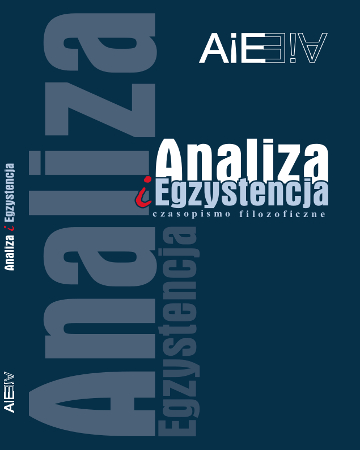
ISSN: 1734-9923
eISSN: 2300-7621
OAI
DOI: 10.18276/aie.2017.38-04





Issue archive /
38 (2017)
O sprawcy działania i odpowiedzialnym działaniu u Arystotelesa
(Aristotle about the Agent and the Responsible Action)
| Authors: |
Maciej
Smolak
Instytut Filozofii UJ |
| Keywords: | decision fine man of the highest order responsibility virtue of character |
| Data publikacji całości: | 2017 |
| Page range: | 22 (67-88) |
Abstract
At EN III.1 1109b31-32 Aristotle says we praise and censure voluntary actions and
we feel sympathy for involuntary actions, and sometimes even pity. Next he examines
which actions are voluntary and involuntary. This examination is connected with
determination of the conditions under which the person is auctor agendi and thus
can respond for the action. But it is not right to say, when somebody is auctor agendi
his action is responsible. Hence, to answer to the question which action is responsible
action in Aristotle, the author considers the issue in two stages. The first stage
is devoted to clarification what does it mean to be the agent of action. The second
stage gives the explanation of what does it mean “to decide for the action accordance
with virtue because of it”. As the result, the author demonstrates that the responsible
action is taken on the basis of decision and for the sake of fine. He shows such action
is fine because: a) the realized end is fine; b) it is choiceworthy in itself; c) the
motive of the agent is the fine.
Download file
Article file
Bibliography
| 1. | Aristote (1958). L’ Éthique à Nicomaque. T. I: Introduction et Traduction par |
| 2. | R.A. Gauthier et J.Y. Jolif. Louvain: Publications Universitaires. |
| 3. | Aristote (1959). L’ Éthique à Nicomaque. T. II: Commentaire par R.A. Gauthier |
| 4. | et J.Y. Jolif J.Y., partie 1. Louvain: Publications Universitaires. |
| 5. | Aristoteles (1960). Aristotelis Opera ex recognition I. Bekkeri, edition altera quam |
| 6. | curavit O. Gigon. Berolini. |
| 7. | Aristotle (1985). The Nicomachean Ethics. Transl. with Commentaries and Glossary |
| 8. | by T. Irwin. Indianapolis: Hackett Publishing Company. |
| 9. | Arnold, D.G. (2001). Coercion and Moral Responsibility. American Philosophical |
| 10. | Quarterly, 38, 53–67. |
| 11. | Bondeson, W. (1974). Aristotle on Responsibility for One’s Character and the Possibility |
| 12. | of Character Change. Phronesis, 19, 59–65. |
| 13. | Bostock, D. (2000). Aristotle’s Ethics. New York: Oxford University Press. |
| 14. | Cooper, J.M.C. (1999). Reason and Emotion: Essays on Ancient Moral Psychology |
| 15. | and Ethical Theory. Princeton: Princeton University Press. |
| 16. | Galewicz, W. (2003). Z Arystotelesem przez greckie tragedie. Cz. 2: O błądzeniu, |
| 17. | przymusie i dobrowolności. Kraków: Wydawnictwo Literackie. |
| 18. | Hursthouse, R. (1984). Acting and Feeling in Character: Nicomachean Ethics 3.i. |
| 19. | Phronesis, 29. |
| 20. | Irwin, T.H. (1980). Reason and Responsibility in Aristotle. W: A.O. Rorthy (red.), |
| 21. | Essays on Aristotle’s Ethics (s. 117–155). Berkeley–Los Angeles: University |
| 22. | of California Press. |
| 23. | Irwin, T.H. (1996). Ethics in the ‘Rhetoric’ and in the ‘Ethics’. W: A.O. Rorthy |
| 24. | (red.), Essays on Aristotle’s ‘Rhetoric’ (s. 142–174). Berkeley–Los Angeles: |
| 25. | University of California Press. |
| 26. | Korsgaard, Ch.M. (1996). From Duty and for the Sake of the Noble: Kant and Aristotle |
| 27. | on Morally Good Action. W: S. Engstrom, J. Whiting (red.), Aristotle, |
| 28. | Kant, and the Stoics. Rethinking Happiness and Duty (s. 203–236). New York: |
| 29. | Cambridge University Press. |
| 30. | Moline, J.N. (1989). Aristotle on Praise and Blame. Archiv für Geschichte der |
| 31. | Philosophie, 71 (3), 283–302. |
| 32. | Meyer, S.S. (2006). Aristotle on the Voluntary. W: R. Kraut (red.), The Blackwell |
| 33. | Guide to Aristotle’s Nicomachean Ethics (s. 137–157). Oxford: Blackwell |
| 34. | Publishing. |
| 35. | Pańpuch, Z. (2015). Szczęście a polityka. Aretologiczne podstawy politologii Platona |
| 36. | i Arystotelesa. Lublin: Wydawnictwo KUL. |
| 37. | Price, A.W. (1989). Love and Friendship in Plato and Aristotle. Oxford: Oxford |
| 38. | University Press. Ricoeur, P. (1990). Soi-même comme un autre. Paris: Editions |
| 39. | du Seuil. |
| 40. | Smolak, M. (2013). Przyjaźń w świetle etyki Arystotelesa. Kraków: Wydawnictwo |
| 41. | Uniwersytetu Jagiellońskiego. |
| 42. | Smolak, M., Łacina, K. (2015). Argument z funkcji – Etyka nikomachejska, 1.7, |
| 43. | 1097b22-1098a17. W: K. Bałękowski, K. Maciąg (red.), Filozoficzne rozważania |
| 44. | o człowieku, wolności i wartościach, Lublin: Fundacja na rzecz promocji |
| 45. | nauki i rozwoju TYGIEL. |
| 46. | Wesoły, M. (2012). Dusza żywienna (wegetatywna) zwierząt w koncepcji Arystotelesa. |
| 47. | W: K. Ilski (red.), Człowiek w świecie zwierząt – zwierzęta w świecie |
| 48. | człowieka (s. 87–106). Poznań: Wydawnictwo Naukowe UAM. |
| 49. | Whiting, J. (2002). Eudaimonia, External Results, and Choosing Virtuous Actions |
| 50. | for Themselves. Philosophy and Phenomenological Research, 65, 270–290. |